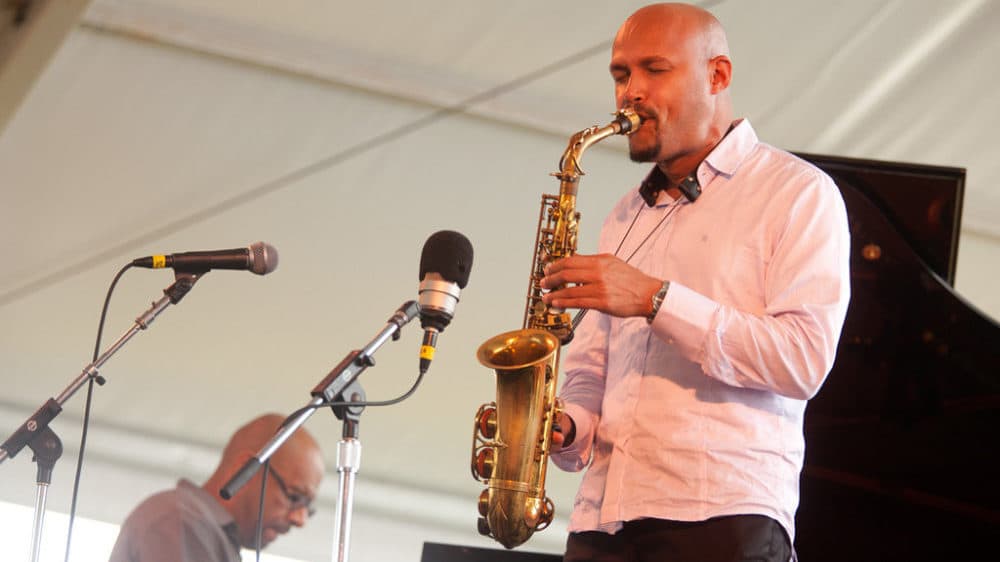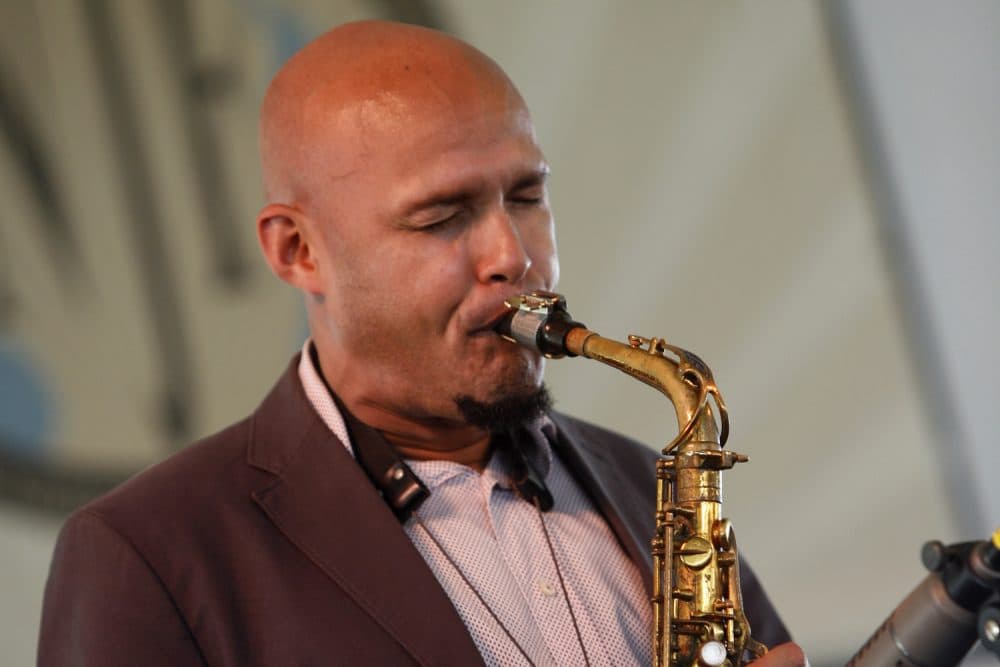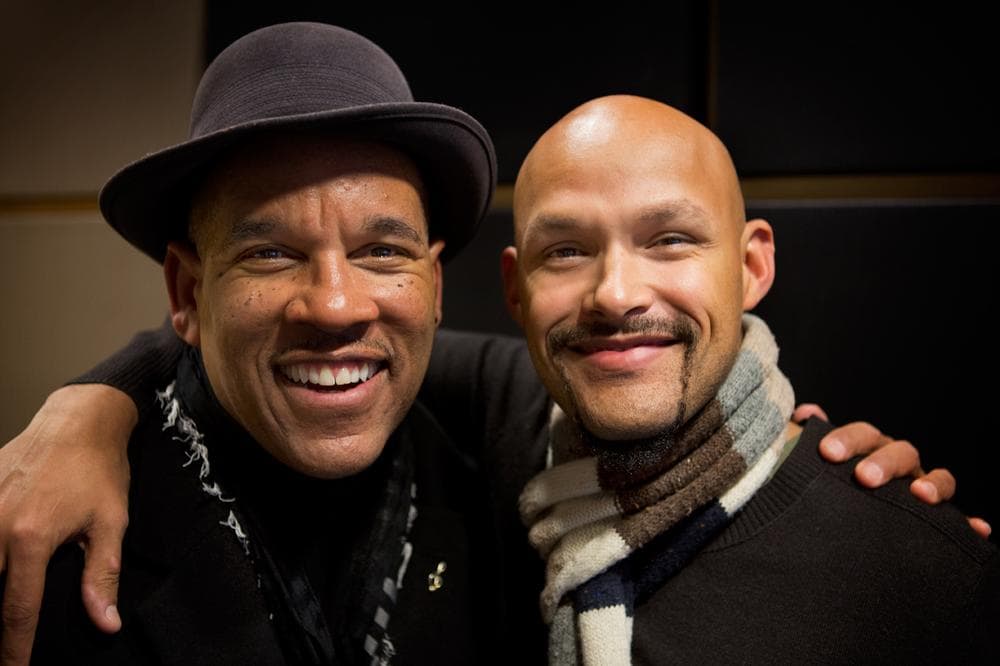Advertisement
In Latest Album, Miguel Zenón Explores His Hybrid Identity And Puerto Rican Folklore

There is more tradition than meets the untrained ear in “Yo Soy la Tradición,” the latest album by Puerto Rican-born composer, sax player and MacArthur “genius” Miguel Zenón. You may not detect familiar dance rhythms or tunes in it, because Zenón selected melodies rooted deep into Puerto Rico’s folklore to create an imaginative and multilayered chamber music opus.
“Yo Soy la Tradición” is an eight-part suite Zenón composed for his alto sax and the Spektral Quartet’s strings. The group will perform this Thursday, Nov. 15, at a concert presented by the nonprofit Latino organization Inquilinos Boricuas en Acción (IBA), at First Church in Boston. Another performance is scheduled on Wednesday at UMass Amherst.
Zenón's suite is inspired by traditional music and popular customs as well. “The idea was that I was delving into a lot of different traditions in Puerto Rico — some of them are musical, some of them are cultural traditions — and I tried to translate them into this sort of platform,” he said.
This would not be the first time that Zenón digs into his own roots. The Berklee College of Music alum who is a multiple Grammy nominee, and a Guggenheim and MacArthur Fellow, has released 11 albums as a lead performer. Most of them involved some kind of exploration of Puerto Rican music, such as música Jíbara, plena, and his 2014 album “Identities are Changeable” which surveyed questions of national identity in the Puerto Rican diaspora, in and around New York City. “Yo Soy la Tradición,” is part of his ongoing pursuit exploring his hybrid identity.

He says that urge for introspection came after he left Puerto Rico. “After living in the United States for more than half of my life, I’ve been trying to develop my own identity, what it means to me to be a Puerto Rican living somewhere else, and developing music somewhere else, while being connected to my roots and my upbringing.”
Elsa Mosquera Sterenberg is the director of the arts programs at Boston’s IBA, and admires Zenón’s work for a number of reasons. “It’s impossible to be Puerto Rican and not question your identity,” she said. “Imagine, you’re born into a culturally Hispanic country, but it’s really a part of the United States, but you really don’t have all the rights of regular citizens living in the mainland, and you live on this island in the Caribbean. There is a constant question of identity. Miguel explores that and he talks to his fellow Puerto Ricans [through his music] because we all feel that way.” For Mosquera Sterenberg, the folk melodies on Zenón’s album are not always recognizable in their jazz clothes, but strongly evocative.
The track “Rosario,” for example, is based on the melody that folks in rural areas chant as they recite the holy rosary. “What drew me to that melody specifically,” Zenón said, “is that even though it’s something that’s performed by just regular people who are non-musicians, it’s very intricate and very complex musically, a lot of […] changing meters, rhythmic things and harmonies and all that. So that was very attractive to me, because it was something that you could feel was very rooted, but at the same time, musically, it had a lot to say, a lot to give, you know?”
During the interview, the musician broke into the lilting song to make his point. On the album, Zenón introduces Rosario’s melody on the saxophone slowly, then embellishes it at high speed, entering a bouncy and syncopated exchange with the quartet’s strings, to create a rich chamber music sound.

The complexity of Zenón’s score didn’t go unnoticed by jazz critic and WBGO’s director of editorial content Nate Chinen, whose new book: “Playing Changes: Jazz for the New Century” profiles Zenón. “I was struck by how sophisticated the string quartet writing was,” he said. Chinen said this recording is different from the “jazz-plus-strings album” tradition, going back to Charlie Parker, in which the strings are often ornamental, or form a backdrop for the soloist out-front. “What’s so brilliant about this new album,” he said, “is that it feels completely integrated. The strings are not background players, they're not an afterthought, and the composition is so accomplished that everything feels necessary and everything feels like part of the same fabric.” In that sense, the string quartet-plus-sax becomes a true quintet.
This complex score provided a steep and intense learning curve for violinist Maeve Feinberg who joined the Spektral Quartet in 2016, the same year she graduated from Boston’s New England Conservatory with a bachelor’s degree in violin performance.
“Part of it was learning how to take in the essence of this music, which is so visceral and has so much character in it,” she said. Feinberg said even though Spektral Quartet is used to playing a wide range of music, different time periods, genres, and complex rhythms, Zenón brought in cultural elements that were completely new to them.
“At one point in the process, he sent us audio files of the original folk melodies that he’d used as his inspiration,” she said, “and it was a sort of lightbulb moment.” Feinberg said the rhythmic pulse of the pieces felt very different from what they had first read on the score. You can hear that constantly shifting pulse in the piece "Cadenas," which ends with a graceful melody on the saxophone, stretching above the strings. Zenón said that folk pulse “is the seed of the music speaking through the project, and saying through all of these different layers that what’s there is something that is very traditional, very folkloric.”
Last year, a day before the group began recording the album, hurricane Maria hit Puerto Rico. Fortunately, Zenón’s relatives were fine, but he said there was an uneasiness in the recording studio. “It was definitely very present in the playing and in the making of the record.”
This fall, just over a year after the hurricane devastated the island, the group debuted the album as a benefit concert at the Segundo Ruiz Belvis Cultural Center in Chicago. They raised over $4,000 for the Chicago Aid for Puerto Rican Arts Fund.
“When the album came out, it was not just a music project for us anymore,” Feinberg said. “Being able to play at a Puerto Rican cultural center and engaging with that community was really meaningful.”
Elsa Mosquera Sterenberg, of the IBA, said in the aftermath of hurricane Maria, she has seen the Puerto Rican community come together in the Boston area like never before. The city holds a special meaning for Zenón. He graduated from Berklee 20 years ago and is teaching in the jazz department at NEC. “It’s like going back home,” he says, “every time I’m there playing, I’m just very nostalgic.”